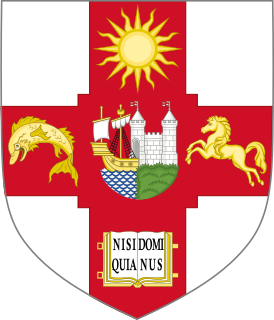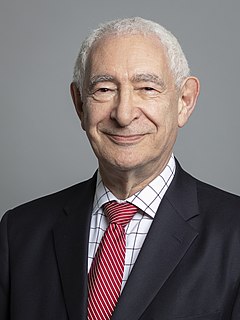The following are organisations and institutions associated with but not part of the University of Cambridge.

Chalmers University of Technology is a Swedish university located in Gothenburg that focuses on research and education in technology, natural sciences, architecture, mathematics, maritime and other management areas.

The University of Bristol is a red brick Russell Group research university in Bristol, England. It received its royal charter in 1909, although it can trace its roots to a Merchant Venturers' school founded in 1595 and University College, Bristol, which had been in existence since 1876.

Wolfson College is a constituent college of the University of Cambridge in Cambridge, England. The majority of students at the college are postgraduates. The college also admits "mature" undergraduates, with around 15% of students studying undergraduate degree courses at the university. The college was founded in 1965 as "University College", but was refounded as Wolfson College in 1973 in recognition of the benefaction of the Wolfson Foundation. Wolfson is located to the south-west of Cambridge city centre, near the University Library.

The Santa Fe Institute (SFI) is an independent, nonprofit theoretical research institute located in Santa Fe, New Mexico, United States and dedicated to the multidisciplinary study of the fundamental principles of complex adaptive systems, including physical, computational, biological, and social systems. The institute is ranked 24th among the world's "Top Science and Technology Think Tanks" and 24th among the world's "Best Transdisciplinary Research Think Tanks" according to the 2020 edition of the Global Go To Think Tank Index Reports, published annually by the University of Pennsylvania.

David Maxim Triesman, Baron Triesman is a British politician, merchant banker and former trade union leader.

The Aristotle University of Thessaloniki is the sixth oldest, and among the most highly ranked, tertiary education institution within Greece. Named after the philosopher Aristotle, who was born in Stageira, about 55 km east of Thessaloniki, it is the largest university in Greece and its campus covers 230,000 square metres in the centre of Thessaloniki, with additional educational and administrative facilities elsewhere.
Ben J. Bussey is an American planetary scientist.

St. Stephen's College is a constituent college of the University of Delhi. It was established in 1881 by the Cambridge Mission to Delhi. The college admits both undergraduates and postgraduates and awards degrees in liberal arts and sciences under the purview of the University of Delhi.

Microsoft Research (MSR) is the research subsidiary of Microsoft. It was created in 1991 by Richard Rashid, Bill Gates and Nathan Myhrvold with the intent to advance state-of-the-art computing and solve difficult world problems through technological innovation in collaboration with academic, government, and industry researchers. The Microsoft Research team has more than 1,000 computer scientists, physicists, engineers, and mathematicians, including Turing Award winners, Fields Medal winners, MacArthur Fellows, and Dijkstra Prize winners.

Jesus Is Lord Church Worldwide (JILCW), or more commonly known as Jesus Is Lord Church (JIL), is a Christian megachurch based in the Philippines. It describes itself as a Full Gospel, Christ-centred, and Bible-based church, with 5 million members in 60 countries as of 2018. Most members abroad are overseas Filipino workers and their families.
The Cognition and Brain Sciences Unit is a branch of the UK Medical Research Council, based in Cambridge, England. The CBSU is a centre for cognitive neuroscience, with a mission to improve human health by understanding and enhancing cognition and behaviour in health, disease and disorder. It is one of the largest and most long-lasting contributors to the development of psychological theory and practice.

Claudia Joan Alexander was a Canadian-born American research scientist specializing in geophysics and planetary science. She worked for the United States Geological Survey and NASA's Jet Propulsion Laboratory. She was the last project manager of NASA's Galileo mission to Jupiter and until the time of her death had served as project manager and scientist of NASA's role in the European-led Rosetta mission to study Comet Churyumov–Gerasimenko.

The École européenne de chimie, polymères et matériaux of Strasbourg is a public engineering school in the city of Strasbourg, in Alsace, France. It was founded in 1948, and is located on the Cronenbourg Campus of the University of Strasbourg. Each year 90 students graduate from the school with a diplôme d'ingénieur. It is a National School of Engineers, part of the University of Strasbourg and a member of the Fédération Gay-Lussac, which recruits from the common polytechnic entrance examination. It is also part of the Alsace Tech network of nine engineering schools in Alsace. The ECPM offers its students three specialties: chemistry, polymers or materials.
Tertiary Students Christian Fellowship is a New Zealand evangelical Christian student movement with affiliate groups on most university campuses, as well as some polytechnics and other tertiary institutions. It is a founding member of the International Fellowship of Evangelical Students. With a firm commitment to evangelism and mission, the four principles which guide the TSCF ethos are undivided life, deep thought, global reach and true witness. TSCF partners with approximately 2000 supporters, 1000 students and 27 staff members.

The University of Cambridge is a collegiate research university in Cambridge, United Kingdom. Founded in 1209 and granted a royal charter by Henry III in 1231, Cambridge is the world's third oldest surviving university and one of its most prestigious, currently ranked second best in the world and the best in Europe by QS World University Rankings.

Advocates of Science and Technology for the People or simply Agham is a non-governmental science advocacy organization based in the Philippines. Founded in 1999 by professors and students of the University of the Philippines Diliman, the group focuses its campaigns and community service in the areas of food security, public utilities, environment, national industrialization, science education, and the welfare of scientists in the country.
The Society for Advancement of Chicanos/Hispanics and Native Americans in Science (SACNAS) is a society that aims to further the success of Chicano/Hispanic and Native American students in obtaining advanced degrees, careers, leadership positions, and equality in the STEM field. Founded in 1973, SACNAS has over 20,000 members and 110 chapters on college campuses across the United States and United States held territories. SACNAS began in junior and high schools through graduate and undergraduate programs with the purpose of mentoring students of minority backgrounds. The society does not discriminate against any group, and benefits African American, Asian American, and white students, as well as those who are in the social sciences. In the past decade alone, SACNAS has experienced major growth. The society experienced an increased participation rate of 40% for their annual conferences between 2005 and 2010, while jumping from 32 to 50 chapters on college campuses across the nation between 2007 and 2010. The society's revenue increased as well, moving from $2.3 million to $3.8 million from 2007 to 2010, a total growth of 65%. SACNAS is the largest multicultural STEM diversity organization in the US.

For our Future's Sake (FFS) was a student-led pressure group supporting a referendum on the Brexit withdrawal agreement. It represented at least 60 Students’ Unions, and 980,000 students, across the UK.
Cambridge Zero is Cambridge University's response to climate change. Led by Dr Emily Shuckburgh OBE, a climate scientist, mathematician and science communicator, it is an interdisciplinary and collaborative initiative created "to harness the full range of the University’s research and policy expertise, developing solutions that work for our lives, our society and our economy".